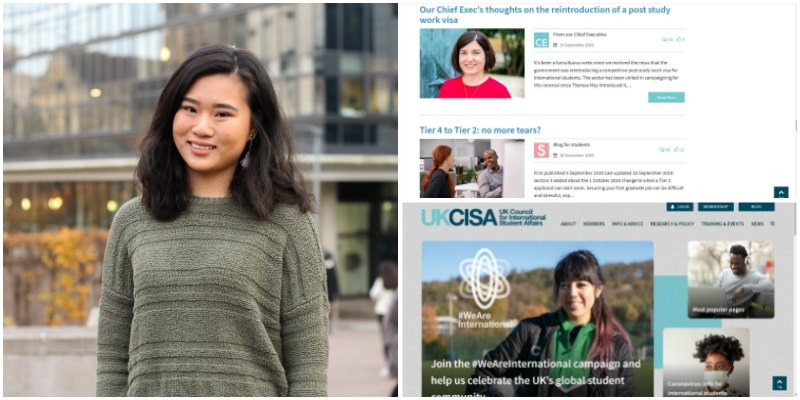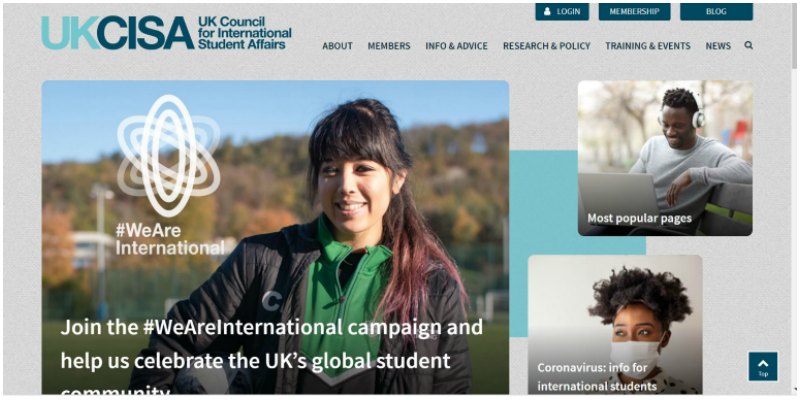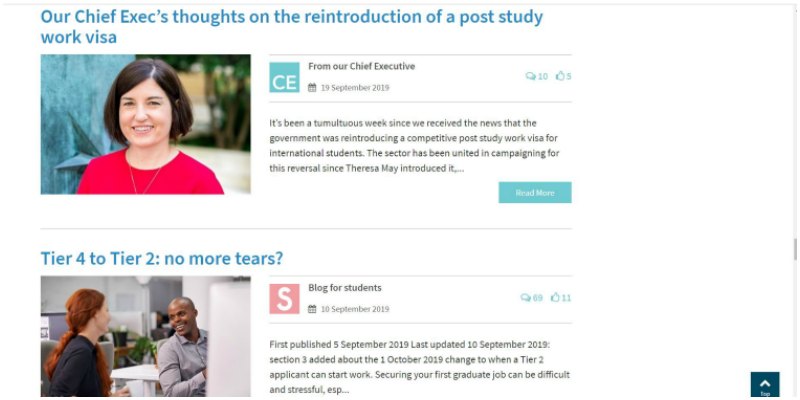UKCISA: International Student Graduate Employability and Visa

I (Anastasia) joined a webinar entitled “International Student Graduate Employability”. The event was conducted on 18 November. When I joined the event, I was excited since they invited a member of the House of Lord: Lord Karan Bilimoria to share his experience on becoming an international student and his journey to success.
Lord Karan is from India. He initially came to the UK just to study law. Thus, he experienced the same struggle international students have gone through such as admission steps, securing a CAS letter, gaining money to cover living costs and tuition fee. Later he admits that he is not from a rich family. So, he applied for the Indian YMCA scholarship to be able to study in the UK.
“It was fantastic to be an international student in the UK” - says Lord Karan. He told us that the benefits are the connections we made for life. He made friends for life and opine that international students are the bridge between their own country and the UK. This is important as the UK is a global power country which surpassed superpower countries!
Fact! 40-50 World Leaders are educated in the UK and US and are the one who achieved the Chevening Scholarship. Moreover, 40% of world academics are from the Royal Societies Cambridge.
Going back to the “bridge between countries”, the concrete example is the Indian-UK research society. This society is very successful and has produced valuable research.
There are always possibilities to stay in the UK to do research, working, etc. Unfortunately, these possibilities were taken away in 2012 with the removal of the Graduate Scheme Visa. Fortunately, with the change of the Prime Minister, Lord Kahan succeeded in convincing the Prime Minister to bring this scheme back.

Next the webinar led by AGCAS which is an organisation that supports international students on their future career. They showed us statistical data of international student employability based on National Survey, National Database and Bespoke Survey and Research.
The data showed us that international graduate employability is not far from domestic students with 52% of international students in full-time employment whilst 60% in domestic students. The amount of unemployed international graduates is merely 5% while 3% for domestic graduates.
The next speaker is Sarah Cooper from Bristol University. She gave us tips in securing a career in the UK as an international graduate:
1. Make the best use of our career service
2. Know our goals after graduating
3. Know what we want to do at each stage of our time
Knowing our goals: before continuing reading, ask yourself what is your unique value as an international student?
Can't identify any? Here you go!
1. We got specialists knowledge from our degree
2. Our language skills
3. International cultural awareness
4. Professional skills & behaviour
5. Knowledge of the home market (i.e. market in your country)
Use these values as your positive values! Remember, all of these are only available in international graduates. We are distinctive!
But, to not waste our time, identify who needs us. To help you figured it out, think about this:
• Identify employers/sectors that might need this (i.e. sector that is related to our knowledge and speciality)
• Think about our experience from the UK when we are going back home. Because yes people, we can use a lot of knowledge just by our experience studying in the UK.
The next very useful tip I got was also this wonderful table about what to do and when to do it along with our study here.
First Year Middle years Final year/PGT
Societies Internship or other career-related work experience Clarify your goals and targeting
University roles Employability Award Schedule recruitment deadlines
Make friends from around the world Employer events Educate yourself on visas (if you want to stay)
Employer events Alumni networking - LinkedIn Apply for jobs/study/start-up visa
Explore Experience Apply
Relating to this, is the next webinar I attended the following hour entitled “Working Visa in the UK”. The event was moderated by Andrew Humphrey. He explained to us about the information published by the government regarding the graduate scheme visa. However, this is not yet official rules.

The Graduate Scheme was announced in September 2019. In September 2020, it was decided that they will start this programme in summer 2021 (date unknown).
What is a Graduate Scheme?
It is a visa for students who completed a UK degree (i.e. degree gained from tier 4 sponsoring university). This visa allows graduates with Undergraduate and Postgraduate degree to gain 2 years of visa and 3 years visa for PhD.
The government is not distinguishing this. They are happy with all current tier 4 visa holders (i.e. all current international students).
Who is eligible?
• Graduates who are graduating in and after summer 2021.
• Graduates with a degree regardless of the level of the course (e.g. Bachelor, Master, etc). Thus a diploma might not gain this visa.
• Due to COVID, students who are not currently in the UK (i.e. those who are studying remotely) still can gain this visa as long as they are going back to the UK minimum 1-semester prior graduation.
How to apply and what are the requirements?
• The application will open in summer of 2021. However, there are no official steps yet as it hasn’t been officially announced.
• We must have an ongoing tier 4 visa (student visa) to apply for this visa.
• The application must be done when we are physically in the UK. We can’t apply when we are abroad regardless if our tier 4 visa is still ongoing.
• No sponsors from either university or employers are required. All graduates with a degree (as above) can apply for it! We just have to show required documents and prove our student visa
• No maintenance requirement - no bank statement, CAS letter, etc.
• There might be an application fee but it is TBA.
• Also might be an immigration health surcharge
In a nutshell, this is the same steps as the student visa extension.
About Immigration health surcharge...
What is this? it is a charge you need to pay if you want to stay in the UK. This charge covers national service on emergencies, NHS, etc.
But, it is not sure yet if this charge would be applied.
If it is applied, the estimation would be £1248. This estimation is derived from current surcharge students have to pay to study in the UK.
Next, Andrew was discussing the employment possibilities international graduates can gain with the existence of this scheme.
1. Can apply for jobs that normally don’t offer 2 years visa
2. Can work with employers that love us but can't sponsor us. At least 2 years experience with them is nice right?
3. Freelancing, self-employment, consultancy, contracting - there is no work visa to do self-employment and Tier 4 visa can't do this
4. Start your own business - This can also be a start-up visa. However, such visa needs an endorsement whilst the Grad Scheme visa doesn't require an endorsement.
5. Part-time or temporary work
Despite all this, we can even just stay in the UK and not work at all! However, they expect/assume us to use this opportunity for something.
Moreover, this scheme might also open new opportunities:
1. Teacher training
2. Training or working as a lawyer, architect, pharmacist (Normally they need sponsor but they won’t need one with this visa)
3. Optometrist
4. Creative industry
We still can’t work as a professional coach, doctor or dentist though… These professions need a licence.
Although all of the above seems to be too good to be true, there are disadvantages to this scheme - Educating employers
• We expect the home office to educate employers so they are aware of this program and can employ us without needing to sponsor us. This is due to their current mindset towards international students is that they have to sponsor them. So, they prefer locals.
• Some employers might still prefer us to have a permanent visa. So, they might still want to sponsor us. This might be because some employers want us to stay in their company for longer, not just temporary.
• Some employers are willing to pay skilled worker (tier 2) for immigration health surcharge. But, it is unlikely.
How about after 2 / 3 years?
We can’t extend this graduate scheme ourselves. we will need a sponsor for extending the visa. A start-up and innovator visa might be the option. Furthermore, it is possible in the 2 years time we found a spouse or partner. This can also be used for extending our visa.
Or, just go home after having a good time in the UK 🙂
Lastly, some catch on this visa program.
• We can't ask someone else (e.g. Parents or spouse etc) who haven't stayed in the UK as a student to come and live here using the graduate scheme visa. This visa is not for them.
• We can’t use this visa for studying. If you wish to study further, you have to apply for another student visa. If we want to study, we can only take night classes, online classes, short classes, etc.
• The time spent in the UK using this visa doesn't count as 5 years of sponsored work visa. Thus, we can’t apply for UK permanent residence.
So, if we want to apply for permanent residence, we have to work using a working visa for 5 years EXCLUDING 2 years of this visa
That’s all the information I gain from the UKCISA webinar. I hope this information is useful if you are deciding to stay in the UK after your study :D.
